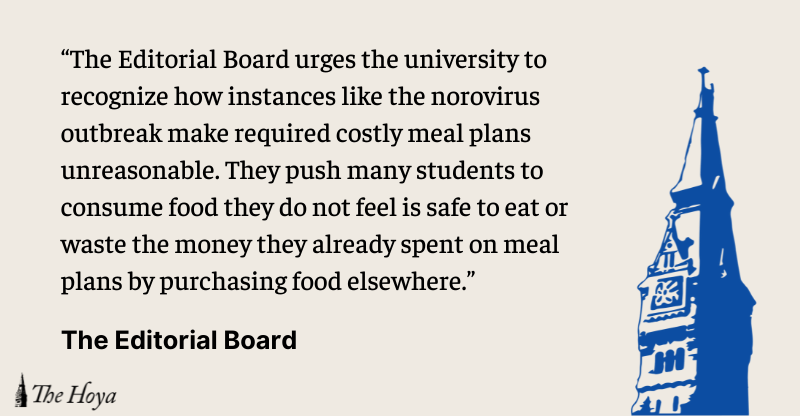On Tuesday, Sept. 21, Georgetown University’s Chief Public Health Officer Dr. Ranit Mishori (MED ’02) notified community members of an unknown gastrointestinal illness affecting a number of students on campus. Just three days later, Mishori announced two samples tested positive for norovirus, a highly contagious virus causing vomiting and diarrhea. As of Monday, Sept. 27, a total of 130 community members have developed symptoms consistent with norovirus.
As the university continues to investigate the cause of the norovirus outbreak, some students feel compelled to turn to off-campus dining options for fear that Leo J. O’Donovan Dining Hall is the source of the gastrointestinal illness.
Student distrust in campus dining in light of the norovirus outbreak calls attention to the shortcomings of Georgetown’s dining services. The university has required all students living on campus to purchase meal plans, a departure from its previous, more flexible policy, which let sophomores purchase a reduced meal plan and juniors and seniors opt out entirely. Now, all residential undergraduate students are required to purchase a meal plan, with prices ranging from $1,614 to $3,560.
The Editorial Board urges the university to recognize how instances like the norovirus outbreak make required costly meal plans unreasonable. They push many students to consume food they do not feel is safe to eat or waste the money they already spent on meal plans by purchasing food elsewhere. Georgetown should work toward providing refunds for the remainder of the semester and discontinuing meal plan requirements starting in the spring 2021 semester.
The decision intended to ensure students had consistent access to convenient meals and was a bold step for the university to take, considering it could only succeed with the full trust of the student body. But for many students, the norovirus outbreak has weakened their already wavering confidence in the administration’s meal plan mandate, pushing them to seek meals outside of their required plan.
The university meal plan requirement aims to incentivize students to eat on campus, the additional costs brought about by food safety concerns on campus have been difficult to deal with, according to Maria Clara Pereira (COL ’23).
“I’ve definitely had to make more of my own meals and spend more on groceries. It’s just a little bit frustrating because I have 14 meals a week through the meal plan that I haven’t used for the past week and a half, so it’s kind of a waste of money. Hopefully they refund us,” Pereira said in an interview with The Hoya.
Even if students on meal plans with 14 or seven swipes per week, the minimum requirement for juniors and seniors respectively, were to use all their meal swipes over the semester, the cost of each meal would total to almost $13. This cost is significantly higher than the cost of groceries for home cooking or meals at off-campus restaurants.
The cost of meal plans offered is an unreasonable financial burden for students, according to Georgetown University Student Association Senate Vice Speaker Rowlie Flores (COL ’22).
“Meal plans at Georgetown, in general, are very expensive, and if you are a freshman or a sophomore, this means spending $3,200 on a meal plan that you’re not likely going to use to its full extent,” Flores said in a Zoom interview with The Hoya for an article published on Sept. 2, 2021. “Essentially, it is just a line cost to the tuition. It’s like paying for a service you’re not going to use.”
Flores’ comment about students not using the meal plan to the full extent predicted the situation the community currently faces. If students do not trust dining services enough to eat at a Leo’s or another location on campus, they will end up wasting the money they already spent on their meal plan and searching for food elsewhere.
Dissatisfaction with dining services on campus extends back years, as student-run Instagram accounts @georgetownstrugglemeals and @georgetown.hotmess document. Together, the two accounts amass close to 10,000 followers and feature dozens of pictures including undercooked chicken, insects mixed into salads and foreign objects like screws and bolts in food from Leo’s.
In addition to distrust of food quality, many students with dietary restrictions like allergies and gluten intolerance express frustration over the lack of options covered by the meal plan.
In response to the norovirus outbreak and the increase in student concern over food safety, the university has attempted to quell students’ anxiety about eating campus food.
“Following a visit from DC Health, we have determined that campus dining locations, including Leo O’Donovan Hall, can safely remain open,” a university spokesperson wrote in an email to The Hoya. “While we know this situation is distressing, students should feel comfortable and safe accessing dining locations on campus.”
While encouraging that DC Health has determined it is now safe for students to eat at campus dining locations, the university needs to continue improving the student dining experience on campus.
Georgetown must restore students’ trust in its dining services by discontinuing the meal plan requirement to ensure students feel safe and financially secure dining on campus.
The Hoya’s Editorial Board is composed of six students and is chaired by the Opinion editors. Editorials reflect only the beliefs of a majority of the board and are not representative of The Hoya or any individual member of the board.














